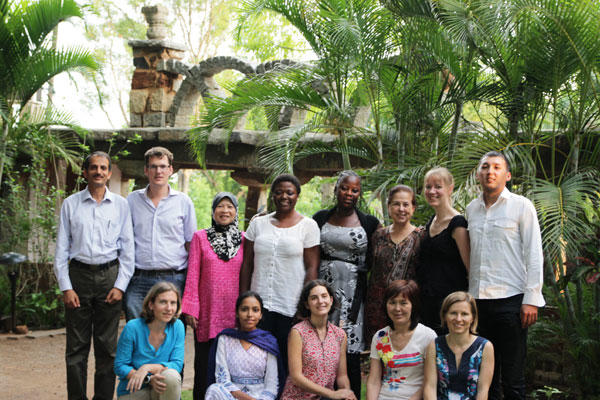A year of gender-responsive participatory research

A year-long Bioversity International Gender Research Fellowship Programme regarding men’s and women’s knowledge, management and preferences related to forest genetic resources concludes with a writeshop in India.
A year-long Bioversity International Gender Research Fellowship Programme regarding men’s and women’s knowledge, management and preferences related to forest genetic resources concludes with a writeshop in India.
For the past year, five Fellows from different national and disciplinary backgrounds have been tasked with integrating gender considerations into large collaborative projects focusing on the sustainable management of forest genetic resources. Working across Africa and Asia, the Fellows have gained experience using participatory methods to analyze gendered knowledge, skills, access to resources and markets, and organizations whose work relates to trees and forests. The closing writeshop of the year-long Gender Research Fellowship Programme took place in Bangalore, India, between 2-6 June 2014 and brought the Fellows together to analyze and write-up their findings and discuss their experiences.
In their respective research areas, the five Fellows adopted a range of participatory tools, such as resource mapping, fruit calendars, four cell analysis, Venn diagrams, and access and control matrices. They additionally carried out focus group discussions with local groups of women and men separated according to gender and age. These separate groups were subsequently brought together to present the knowledge and perceptions they had shared during the various research activities.
Initial findings that emerged from the five Fellows’ research were that knowledge, management and preferences related to forest genetic resources are significantly differentiated according to gender and age. The Fellows noted that women in Kyrgyzstan contribute to sustainable biodiversity management and conservation of walnut forests – but they are often excluded from meetings relating to forest management and have difficulties accessing information.
Women and men participants contributed complementary information regarding the use and management of native tree species that must be examined as a whole to understand local forest management strategies. For example, in South India early findings show that traditional gender-specific knowledge is playing a crucial role in the conservation of the 25 native fruit tree species, including several varieties of wild mango in the Western Ghats.
Conducting research with gender and age-differentiated groups allowed participants to feel at ease sharing their thoughts and knowledge and gave a voice to young women who would not otherwise have spoken in front of men, as well as to young men who were not accustomed to expressing their ideas in a group with their elders.
Bringing the distinct groups together after each participatory research activity increased the community’s overall knowledge of the use and management of native tree species, and generated appreciation among the different interest groups (young men, young women, older women, older men) for each others' knowledge and experiences. These interactions promoted social learning and developed the confidence of women and young men who, often for the first time in their life, publicly presented their ideas in front of more dominant members of their community.
The Fellows expressed their appreciation for the fellowship programme that brought them together to coordinate their research approaches and efforts.
"Working together is completely different than working alone. You can learn a lot from others through group work that you didn’t understand on your own", said Kanaat Musuraliev, Bioversity International Fellow hosted by the Innovation Centre of Phytotechnologies of National Academy of Sciences of the Kyrgyz Republic.
Mawa Karambiri, Bioversity International Fellow hosted by Institut de l’environnement et des recherches agricoles (INERA) in Burkina Faso, added: "Working in a group is a great opportunity to examine gender issues on a broader scale. It allows us to have results from more study sites, to see if we can write papers together in a comparative way and to collaborate in the future."
As they drafted articles based on their findings, the Fellows reflected on how they learned to meaningfully engage with both men and women from different ages, socio-economic classes, ethnicities and castes; and on how, in doing so, they joined a growing community of practice on gender-responsive participatory research.
The Gender Research Fellowship Programme is funded by the CGIAR Research Program on Forests, Trees and Agroforestry and is coordinated by Bioversity International’s Forest Genetic Resources Programme.
The inception workshop was co-organized by Bioversity International and the International Support Group (ISG). National partner institutes actively involved in the Gender Research Fellowship Programme include LIFE Trust (India), the Department of Agriculture (Malaysia), the Institut de l’environnement et des recherches agricoles (INERA) (Burkina Faso), the Innovation Centre of Phytotechnologies of the National Academy of Sciences (Kyrgyz Republic), and The Centre for International Forestry Research (CIFOR).
Photo: Writeshop participants in Bangalore, India. Credit: Bioversity International/M.Elias
